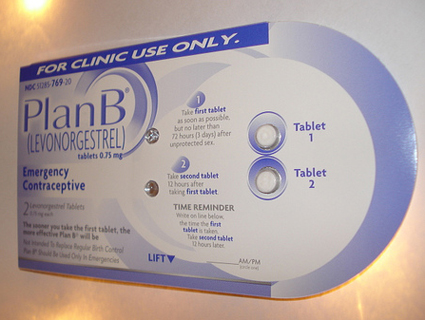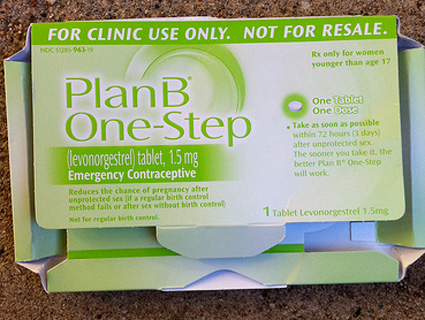
<a href="http://www.flickr.com/photos/22069127@N03/2695489692/">VixyView</a> via <a href="http://compfight.com">Compfight</a> <a href="http://creativecommons.org/licenses/by-nc-sa/2.0/">cc</a>
On Friday, US District Court Judge Edward Korman went all Dikembe Mutombo on the Obama administration’s request to delay implementation of his ruling that emergency contraception be made available over the counter to everyone within 30 days. The Department of Justice announced last week that it is appealing Korman’s April 5 decision.
Korman’s latest order rejecting the request of a stay is, to put it nicely, highly critical of the Obama administration, calling the DOJ’s appeal “frivolous” and an “administrative agency filibuster.”
In its appeal, the DOJ claimed that Korman’s April 5 decision “undermines the regulatory procedures governing FDA’s drug approval process.” But Korman calls this argument “something out of an alternate reality,” given that the FDA’s scientists approved it for use over the counter when Health and Human Services Secretary Kathleen Sebelius overruled their decision in December 2011, implementing an age limit of 17. Sebelius, he writes, “completely lacks” the scientific expertise to decide whether a drug is safe and effective.
Korman also accuses the administration of “sugarcoating” its effort to block access by lowering the age for one brand of emergency contraception, Plan B One-Step, on the day before they filed the appeal. The administration has suggested a three-tiered system that Korman explains as:
- (1) women 15 years of age or older with adequate proof of age will be permitted to purchase Plan B One-Step, which will only be available on the shelves in stores with on-site pharmacies;
- (2) other levonorgestrel-based products will remain behind the counter, but will be available without a prescription to women over 17 years of age who have government issued proof of age; and,
- (3) women who lack adequate proof of age or are under the age of 15 will not have access to Plan B One-Step and must obtain a prescription for another levonorgestrel-based contraceptive product.
Korman calls this proposal “convoluted” and “nonsensical.”
Further, he notes, the Obama administration’s plan still harms all women seeking access to emergency contraception, because they will need to a government-issued identification to prove their age. This is a particular burden on young women, poor women, and minorities, who are less likely to have that ID.
It would, however, benefit Teva, the company that makes Plan B One-Step, Korman writes:
The benefits the proposal would confer on Teva were not insignificant. Because, as the Assistant United States Attorney observed, 99% of Plan B One-Step consumers are aged 15 and above, Teva would lose next to nothing in the way of revenue by limiting sales to those women. On the other hand, Teva’s proposal would enable it to have its product, and its product alone, displayed on the shelves in the family planning area of stores with an on-site pharmacy. Thus, a consumer looking for an emergency contraceptive would only find Plan B One-Step on the shelves, and if she came in after the pharmacy counter was closed, her only option would be Plan B One-Step. If she were under the age of 15, she would have no option, because she could only obtain levonorgestrel-based emergency contraceptives with a prescription.
Moreover, because the FDA claimed that one of the studies conducted by Teva—the so-called “actual use” study—was essential to the approval of Teva’s proposal, Teva enjoys three years of marketing exclusivity to the 15 and 16 year old consumers. The pharmaceutical companies that sell “brand X” versions of Plan B One-Step as well as the two-pill package of the drug could not display their products on the shelf because the old marketing regime remains in effect for them, and their products can only be sold from behind the pharmacy counter. Anyone under the age of 17 needs a prescription to obtain these products, and anyone over the age of 17 can only obtain them from the pharmacy by showing proof-of-age identification.
While this proposal was a boon to Teva, it did little to eliminate the practical obstructions in obtaining emergency contraception to women of child-bearing age whether over or under age 15. On the contrary, Teva will use its privileged marketing status and exclusivity to increase the cost of the drug. The price of Plan B One-Step under the new marketing regime is expected to be $60, significantly more than the one- or two-pill generic version, and could conceivably go higher, if only to accommodate the more expensive packing, age-verification tags, and anti-theft technology that the new marketing arrangement would require. The cost of all emergency contraception, particularly Plan B One-Step, which is the most expensive, is already an impediment to access for many women and adolescents.
The DOJ has until noon on Monday, May 13 to try to appeal to the 2nd Circuit Court of Appeals for a stay.








